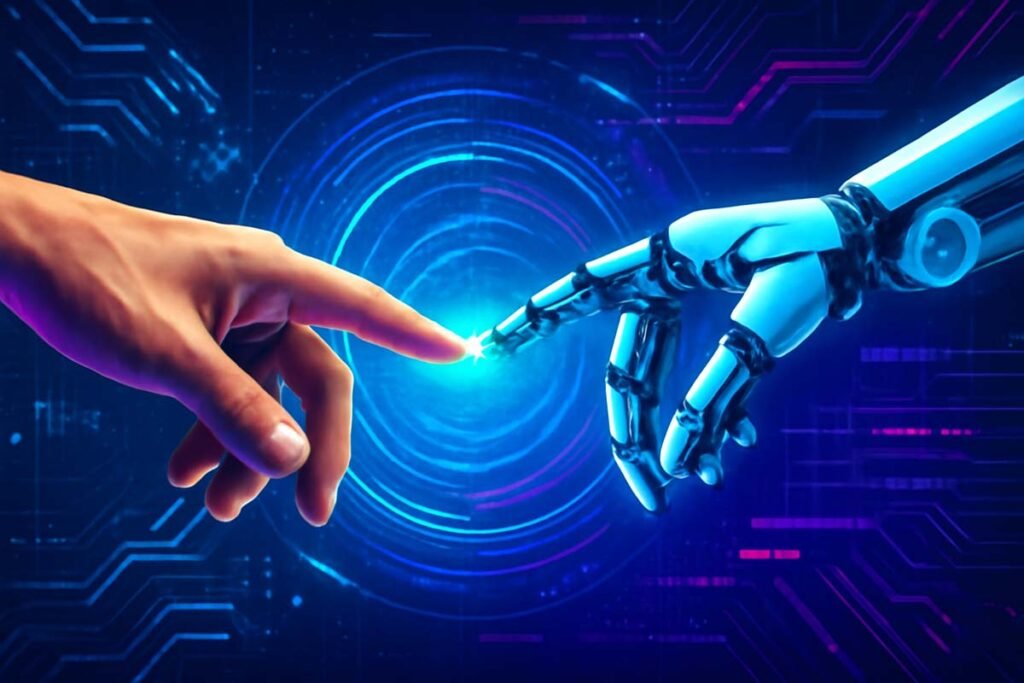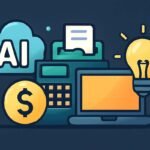Artificial Intelligence (AI) is revolutionizing the world in 2025. What once seemed like the realm of science fiction is now deeply embedded in everyday life and business operations. From virtual assistants on our smartphones to sophisticated algorithms predicting market trends, AI is transforming industries, education, healthcare, and entertainment.
Whether you’re a student eager to understand AI’s basics, a business owner seeking to harness AI power to increase productivity and profits, or simply curious about the technology shaping our future, this exhaustive beginner’s guide will equip you with the knowledge to grasp AI’s concepts, use cases, benefits, challenges, and practical applications.
What Is Artificial Intelligence?
Artificial Intelligence refers to computer systems designed to perform tasks that typically require human intelligence. This includes tasks like learning new information, recognizing patterns, understanding language, making decisions, and solving problems.
AI enables machines to emulate human thinking processes to perform complex tasks — from recognizing faces on photos to conversing in natural language and diagnosing diseases.
Today’s AI systems rely on a combination of fields like:
- Machine Learning (ML): Enabling systems to learn and improve from data.
- Deep Learning: Using neural networks modeled after human brains to understand complex data.
- Natural Language Processing (NLP): Teaching computers to comprehend and produce human language.
- Computer Vision: Allowing machines to analyze visual data such as images and videos.
In 2025, AI has become a tangible part of our lives, embedded in products and services we interact with daily.
A Brief History and Evolution of AI
AI’s origins trace back to the 1950s. The earliest programs mimicked basic reasoning but were limited by hardware and data availability. Significant milestones include:
- 1956: Dartmouth Conference introduces the term “Artificial Intelligence.”
- 1970s–1980s: Rule-based expert systems automate specific problems.
- 1997: IBM’s Deep Blue defeats chess champion Garry Kasparov, marking AI’s power surge.
- 2000s: Rise of machine learning coupled with increased computing power and data.
- 2010s: Breakthroughs in deep learning facilitate real-world applications in speech and image recognition.
- 2020s: Introduction of large language models like GPT-3 makes conversational AI widely accessible.
Our current era blends these advancements into widely accessible technologies powering smart assistants and automation tools.
Why AI Matters in 2025
Several trends explain AI’s indispensable role today:
- Explosion of Data: Digital data increases exponentially, requiring AI to analyze and extract valuable insights quickly.
- Need for Automation: Businesses seek to automate repetitive processes, reduce errors, and operate 24/7.
- Demand for Personalization: Consumers expect customized experiences, achievable through AI’s data analysis capabilities.
- Competitive Advantage: AI adoption translates directly to better decision making, innovative products, and customer engagement.
- Global Problem Solving: AI helps address major challenges like climate change, pandemic responses, and economic forecasting.
With AI investments reaching billions annually, its societal imprint continues to deepen.
Key AI Technologies Demystified
Understanding core AI technologies is essential to grasp its capabilities:
- Machine Learning: Enables adaptive systems that improve with data exposure without explicit programming for every task. Tools like recommendation engines and fraud detection models use ML.
- Deep Learning: Mimics human brain interconnections using layered neural networks, excelling at recognizing complex patterns in images, sounds, and text.
- Natural Language Processing (NLP): Powers voice assistants, chatbots, and language translation services— enabling natural conversations between humans and machines.
- Computer Vision: Allows AI to “see” and analyze visual data, instrumental in autonomous vehicles, security systems, and medical diagnostics.
- Reinforcement Learning: Systems learn optimal behaviors through trial, error, and reward, vital for robotics and game-playing AI.
- Generative AI: Creates new content — images, text, music — using learned patterns, with popular tools like DALL·E and GPT models showcasing creative potential.
Real-Life AI Applications Transforming Industries and Daily Life
AI’s versatility touches many sectors and activities:
Healthcare
AI improves diagnosis accuracy, predicts disease outbreaks, accelerates drug discovery, and personalizes treatment plans.
Finance
AI detects fraudulent transactions, automates trading, advises on wealth management, and optimizes customer service.
Retail
E-commerce sites use AI to personalize shopping experiences, manage inventories intelligently, and streamline logistics.
Transportation
Self-driving cars and AI-assisted traffic management improve safety and reduce congestion.
Education
AI-powered tutoring platforms adapt teaching methods to individual learning styles and automate grading.
Entertainment
Streaming platforms tailor content recommendations using AI, enhancing user engagement.
Customer Service
Chatbots handle routine inquiries round the clock, freeing human agents for complex support.
The Wide-Ranging Benefits of AI
- Efficiency: Automating mundane, repetitive tasks saves time and resources.
- Accuracy: Data-driven decisions reduce risks and errors.
- Personalization: AI enables targeted marketing, individualized education, and tailored healthcare.
- Innovation: AI opens avenues for new business models and products.
- Scalability: AI solutions adapt to growing data and user bases seamlessly.
- Accessibility: AI-powered language translation and assistive technologies foster inclusion.
Businesses and individuals benefit profoundly from these advantages.
Ethical and Societal Challenges of AI
AI presents challenges requiring careful consideration:
- Job Disruption: Automation threatens some roles, emphasizing the need for reskilling and workforce transition support.
- Bias and Fairness: AI systems trained on biased data risk perpetuating inequality, necessitating transparency and fairness audits.
- Privacy: AI’s hunger for data raises concerns over consent and misuse.
- Explainability: Many AI “black boxes” make decision rationale opaque to users and regulators.
- Security: Adversarial attacks on AI models pose novel threats.
- Regulations: Laws and ethical frameworks lag behind AI’s rapid evolution.
Addressing these challenges requires interdisciplinary collaboration.
AI in Education and How Students Can Thrive
Students can harness AI in multiple ways:
- AI chatbots offer 24/7 homework help and explanations.
- Writing aids improve grammar, style, and coherence.
- AI-powered flashcards and quizzes adapt to knowledge gaps.
- Virtual tutors personalize learning paths for better outcomes.
Participating in AI communities and competitions enhances skills and career prospects.
How Businesses Are Leveraging AI for Competitive Advantage
Companies leverage AI to:
- Automate routine processes, reducing errors and costs.
- Personalize marketing messages and product offerings.
- Analyze customer sentiment and market trends.
- Improve supply chain logistics and resource optimization.
- Develop innovative products using AI-driven insights.
Early AI adopters gain measurable improvements in customer satisfaction, efficiency, and growth.
Careers in AI: Opportunities Beyond Coding
Not all AI jobs require extensive coding:
- AI Prompt Engineer: Craft expert prompts to optimize AI-generated content.
- AI Trainer/Data Labeler: Annotate data sets to improve model training.
- AI Project Manager: Coordinate AI initiatives aligning with business goals.
- AI Marketing Specialist: Use AI tools to optimize campaigns and audience segmentation.
- AI Ethics Consultant: Guide responsible AI deployment.
Developing complementary skills like data literacy and communication broadens opportunities.
How You Can Start Using AI Today
- Experiment with AI tools like ChatGPT, Grammarly, or Midjourney.
- Take free online courses to understand AI concepts.
- Join AI forums and communities for continuous learning.
- Volunteer or freelance on data labeling and AI testing jobs.
- Stay informed on AI trends and breakthroughs.
Starting simple accelerates your mastery and career readiness.
Frequently Asked Questions (FAQs)
Q: What is AI in easy words?
AI is technology that allows computers to do tasks that need human thinking.
Q: Will AI steal jobs?
AI will change jobs but also create new chances for skilled workers.
Q: Is AI safe?
When regulated correctly, AI is safe and can greatly help society.
Q: Can I learn AI without coding?
Yes, many roles focus on strategy, data annotation, or prompt engineering without programming.
Preparing for an AI-Powered Future
Artificial Intelligence is reshaping the world. Understanding its principles, applications, and implications prepares you to engage confidently in a fast-changing landscape.
Embrace AI by learning continuously, practicing skills, and exploring tools that amplify your productivity and creativity. This is your gateway to the future.
📩 Subscribe now to get our free guide: “Top 10 AI Tools to Grow Your Income in 2025“.



Pingback: Top 10 AI Tools for Small Businesses in 2025: Save Time & Grow Smarter - firstspost.com
Pingback: Beginner’s Guide to Prompt Engineering – Mastering AI Communication in 2025 - firstspost.com
Pingback: How to Start a Career in Artificial Intelligence – Step-by-Step Guide (2025) - firstspost.com
Pingback: How AI is Disrupting Education: Game-Changing Tools & Trends for Students in 2025 - firstspost.com
Pingback: A Beginner’s Guide to Machine Learning: Concepts, Examples & Free Resources - firstspost.com
Pingback: AI in Everyday Life – 15 Real Examples You’re Already Using (2025) - FirstsPost